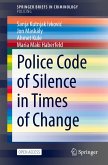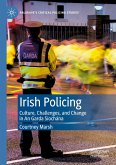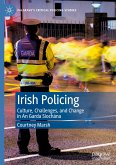'This book compels researchers, activists, policymakers, and practitioners to "think outside the box" when it comes to transforming how police respond to rape. Hohl and Stanko's offering will undoubtedly become a classic piece of innovative feminist scholarship.'
Walter DeKeseredy, Anna Deane Carlson Endowed Chair of Social Sciences, West Virginia University
'How do we increase offender accountability for rape and sexual assault? This book makes an argument that is both impassioned and evidence-based, built on the radical assumption that women have the right to be safe. The authors recognise that transforming justice outcomes requires a transformational shift in police investigative procedures to ensure offender accountability for rape becomes a police priority: women deserve nothing less.
A compelling and comprehensive argument demonstrating the urgent need for a transformational shift in police investigative procedures to hold men who rape accountable when they victimise women.'
Jan Jordan, Emerita Professor of Criminology, Victoria University of Wellington
'Failures around the investigation and prosecution of rape represent one of the greatest continuing policing and justice-related scandals of our age. Written by authors who truly deserve to be called experts, this book is both timely and of huge importance. It will change the way we think about these issues and it should change the way we deal with them.'
Tim Newburn, Professor of Social Policy, London School of Economics and Political Science
'Operation Soteria Bluestone offers the opportunity for change and the promise of a better future if only it can prevail over police history and culture. The early signs are promising and so this is very much a story of hope but, as the authors argue, one that is fragile and susceptible and requires genuine acceptance and buy in at every level of policing. This is an important book and one to which policing must pay attention.'
Chief Constable Sarah Crew, Avon and Somerset Police, National Police Chiefs' Council Lead for Adult Sexual Offences
'This long-awaited book is vital from two of the foremost academic researchers and activists in the policing of rape. It provides an historical context for why the policing of rape has so dismally failed to date and offers a blueprint for transformational change.'
Harriet Wistrich, Director of the Centre for Women's Justice
'The project that is the subject of this book comes from a place of anger and exasperation at the failings of the police to investigate rape well. Stemming from a far-sighted vision of how to sustainably transform the policing of rape and improve the victim-survivor experience, the authors instigated a brave and ambitious academic-police collaboration that seemed impossible to pull off. But by drawing together feminist research and insights on rape and wider policing scholarship to construct a multi-faceted framework for changing the ways in which rape is investigated, and embedding this in police practice, they have pulled it off. This book is as much about police culture as it is about policing rape. It offers hope, inspiration and a tangible way forward for police to improve the investigation of rape. It deserves to be read.'
Michele Burman, Professor of Criminology, University of Glasgow
Walter DeKeseredy, Anna Deane Carlson Endowed Chair of Social Sciences, West Virginia University
'How do we increase offender accountability for rape and sexual assault? This book makes an argument that is both impassioned and evidence-based, built on the radical assumption that women have the right to be safe. The authors recognise that transforming justice outcomes requires a transformational shift in police investigative procedures to ensure offender accountability for rape becomes a police priority: women deserve nothing less.
A compelling and comprehensive argument demonstrating the urgent need for a transformational shift in police investigative procedures to hold men who rape accountable when they victimise women.'
Jan Jordan, Emerita Professor of Criminology, Victoria University of Wellington
'Failures around the investigation and prosecution of rape represent one of the greatest continuing policing and justice-related scandals of our age. Written by authors who truly deserve to be called experts, this book is both timely and of huge importance. It will change the way we think about these issues and it should change the way we deal with them.'
Tim Newburn, Professor of Social Policy, London School of Economics and Political Science
'Operation Soteria Bluestone offers the opportunity for change and the promise of a better future if only it can prevail over police history and culture. The early signs are promising and so this is very much a story of hope but, as the authors argue, one that is fragile and susceptible and requires genuine acceptance and buy in at every level of policing. This is an important book and one to which policing must pay attention.'
Chief Constable Sarah Crew, Avon and Somerset Police, National Police Chiefs' Council Lead for Adult Sexual Offences
'This long-awaited book is vital from two of the foremost academic researchers and activists in the policing of rape. It provides an historical context for why the policing of rape has so dismally failed to date and offers a blueprint for transformational change.'
Harriet Wistrich, Director of the Centre for Women's Justice
'The project that is the subject of this book comes from a place of anger and exasperation at the failings of the police to investigate rape well. Stemming from a far-sighted vision of how to sustainably transform the policing of rape and improve the victim-survivor experience, the authors instigated a brave and ambitious academic-police collaboration that seemed impossible to pull off. But by drawing together feminist research and insights on rape and wider policing scholarship to construct a multi-faceted framework for changing the ways in which rape is investigated, and embedding this in police practice, they have pulled it off. This book is as much about police culture as it is about policing rape. It offers hope, inspiration and a tangible way forward for police to improve the investigation of rape. It deserves to be read.'
Michele Burman, Professor of Criminology, University of Glasgow









